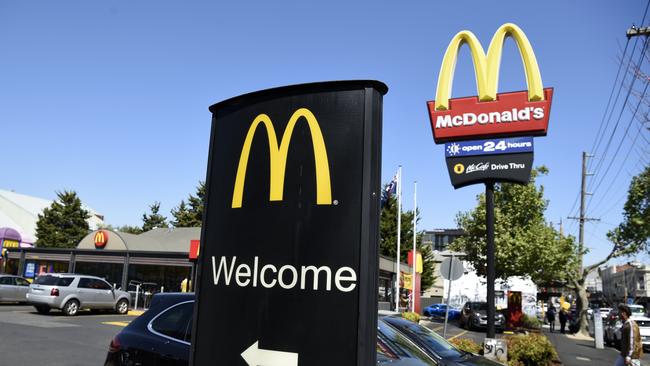Unions put the bite on Maccas as fast food giant opposes multi-employer bargaining push
Bosses say the retail, hospitality and fast food sector will be exposed if unions force McDonald’s into making a multi-employer deal. The ACTU disagrees.

Employers say the retail, hospitality and fast food sector will be unfairly exposed to multi-employer bargaining claims if the retail union succeeds in its bid to force one of the country’s biggest companies, McDonald’s, to negotiate a new deal covering thousands of workers.
In a significant pre-election test of Labor’s workplace laws, McDonald’s is opposing an ACTU-backed application to make the fast food giant negotiate a new multi-employer deal, accusing the retail union of trying to avoid showing it has majority employee support for the claim.
Business groups said the union claim, to be subject to a two-day hearing before a Fair Work Commission full bench in February, was an attempt to expand Labor’s “highly union-friendly supported bargaining stream into industry sectors it was never intended for”.
The supported bargaining stream for multi-employer agreements replaced the ineffective low-paid bargaining stream and aims to assist workers in low-paid industries who have no access to enterprise bargaining.
Previous applications have focused on government-funded employers including childcare but the Shop Distributive and Allied Employees Association application is a first for the private sector.
McDonald’s last made an enterprise agreement with the SDA in 2013 and walked away from enterprise bargaining in 2019, leaving workers on the award minimum.
The SDA application is seeking to force 50 McDonald’s restaurants in South Australia into bargaining.
Under the law, the commission will consider whether low rates of pay prevail in the sector and whether the employers have “clearly identifiable common interests” including geographic location and terms and conditions of employment.
The ACTU has intervened in the case, with secretary Sally McManus on Sunday saying “every McDonald’s store is exactly the same, right down to the pickles, sesame seed buns and minimum award wage pay rates … Everything is standardised to within an inch of its life.
“It makes sense workers should be able to bargain together. After all, they are just keeping with the way McDonald’s franchises operate,” she told The Australian.


Australian Industry Group chief executive Innes Willox said the “supported bargaining stream was intended to operate in sectors where the employers and employees need a lot of support to bargain, typically because of the government-funded nature of those sectors.
“To date, supported bargaining authorisations have only been granted in government-funded sectors. Many hundreds of enterprise agreements have been made in the fast food industry and there is no reason why the main enterprise bargaining laws should not apply, including the requirement for a union to establish that a majority of employees support the negotiation of an enterprise agreement.
“If the SDA succeeds in this case, employers in the fast food, retail, hospitality and many other sectors will be exposed to multi-employer bargaining claims under the supported bargaining stream. Fortunately, McDonald’s is strongly opposing the SDA’s claims. The SDA claim is simply a stalking horse that needs to be rejected.”
In a submission to the commission, McDonald’s said workers had been covered by a series of enterprise agreements prior to 2019 following successful negotiations with the union.
“The only apparent reason for the SDA’s change of preference is the newly enacted ability under (the legislation) to sidestep the requirement to demonstrate majority support for bargaining,” it said.
McDonald’s said the SDA had made no apparent attempt to gauge employee support for an enterprise agreement, none of the employees had directly raised any desire to bargain and the union had not made any meaningful attempt to bargain before filing the application.
In support of its position that the McDonald’s outlets had “clearly identifiable common interests”, the SDA said they sold an identical menu for the same price; employed people to perform similar duties, used common branding as well as similar plant and equipment; and operated enterprises with a common layout, “look and feel” at which low rates of pay prevailed.
McDonald’s denied the franchisees had clearly identifiable common interests, citing the number of restaurants each franchisee operated, different franchisee corporate arrangements, structures, sizes and operations, geographical location, restaurant type, size and facilities.
“Those differences influence, amongst other things, financing, access to capital, staffing levels, rostering, required roles, required duties, training and the like, and thus are capable of impacting the respondents’ bargaining interests,” it said.
SDA South Australian branch secretary Josh Peak said the case was very significant.
He said the union’s assessment was that the most common hourly base rate for a McDonald’s worker was $17.96.
“We’re talking about a very large cohort of some of the lowest-paid workers, if not, the lowest-paid workers in the entire country who, by their very nature, are many workers who are in their first job and have low bargaining power,” he said.
“I think it’s fair to say McDonald’s are the most profitable fast food operators in the country if not the world and to think that their workforce is paid not even 1c above the minimum legal amount they must pay I think is not good enough.”
He said the union, if successful, would seek to address concerns about existing conditions.
“We have got lots of concerns about the rosters of workers, the guaranteed hours, the casualisation of this workforce,” he said.
“We have got concerns about the work health and safety conditions that workers are employed under. We would certainly want to see an improvement to the junior rates of pay.
“We would like to see that adult workers are not having their hours cut at particular times or during holidays so there are a lot of things that we believe are wrong in the way that McDonald’s employ their people, and we think that bargaining is the most appropriate way to address those concerns.”
Responding to McDonald’s claim that the union should have to demonstrate majority support for an agreement, he said such an application was not appropriate given the size of the workforce and that many were in their first job and low paid.
“Workers support our campaign for an enterprise agreement,” he said. “This is a very large workforce spread across the city, many regional towns, working for multiple employers and the union has made an assessment that there is an appropriate stream that we can apply to use, that will see those workers have access to bargaining in circumstances where their employer is refusing to negotiate.”








To join the conversation, please log in. Don't have an account? Register
Join the conversation, you are commenting as Logout